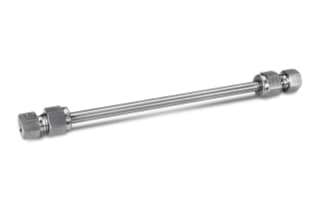
|
Chemistry |
Silica |
|
Separation Mode |
Normal-Phase |
|
Particle Substrate |
Silica |
|
pH Range Min |
2 pH |
|
pH Range Max |
8 pH |
|
Maximum Pressure |
6000 psi (415 Bar) |
|
Endcapped |
No |
|
Bonding Technology |
Silica |
|
Silanol Activity |
High |
|
Particle Shape |
Spherical |
|
Particle Size |
3 µm |
|
Endfitting Type |
Parker-style |
|
Pore Size |
80 Å |
|
Format |
Column |
|
Surface Area |
220 |
|
System |
HPLC |
|
Particle Technology |
Silica |
|
USP Classification |
L3 |
|
Inner Diameter |
4.6 mm |
|
Length |
150 mm |
|
UNSPSC |
41115709 |
|
Brand |
Spherisorb |
|
Product Type |
Columns |
|
Units per Package |
1 pk |

Spherisorb Silica Silica Column, 80Å, 3 µm, 4.6 mm X 150 mm, 1/pk
Spherisorb silica chemistry is a non-bonded unbonded silica substrate for normal phase applications. Spherisorb Columns are made with high-quality bonded phases that allow for a wide range of separation selectivities. Spherisorb Columns come with Parker-style column end fittings, which are industry standard.
Water Spherisorb Columns are produced at cGMP-compliant Waters chromatography chemistry production facilities. The production facility is ISO 9002 certified and FDA-registered as a Class 1 medical device manufacturer. This enables Waters to assure you that all Waters Spherisorb columns will meet the quality requirements demanded by today's regulated laboratories. You have all the tools you need to be successful in any analysis if you choose our equipment, software, chemistries, and services. Only Waters Quality Parts have been thoroughly tested and verified for optimal performance of your Waters systems, ensuring that they are compatible with your Waters instruments. You can count on reliable instrument operation, accurate and repeatable results, and system compliance when you use Waters Quality Parts.
Our website hosts various Waters product offerings that are compatible with the Spherisorb Silica Silica Column listed here. You can review those offerings and other equipment available by Waters from our website and shop for lab equipment so you can replenish your stock and add to your existing equipment portfolio. There are many products and column-cartridge setups to choose from. Your column arrangement should be determined by your selectivity requirements, sample capacity, mobile phase, and financial constraints. Please contact a Waters representative for extra product information and help if you require a configuration that is not included on the website or in our brochure.
You might also be interested in reviewing the Waters Preparative Chromatography Mix Standard; the Quality Control Reference Material portfolio is a unique collection of standards and mixtures that allow the user to evaluate and benchmark their chromatography system before analysis of critical material. The Preparative Chromatography Standard is 5 mg/mL each of Diclofenac sodium salt, Diphenhydramine hydrochloride, and Flavone in DMSO-- this standard mix should be used to confirm the benchmark performance of your preparative or purification system. This particular QC Reference Material is a specially formulated mix that includes a void marker, neutral, acidic, and basic compounds. It can be used with a variety of column chemistries.
How Does Temperature Affect Liquid Chromatography?
Chromatography involves a series of equilibrium reactions where analytes are either dissolved in the mobile phase or adsorbed to the stationary phase of the column. Higher temperatures accelerate the exchange of analytes between the mobile and stationary phases, leading to faster analysis. This means that increasing the temperature enhances the efficiency of the chromatographic process, allowing for quicker separations and improved overall performance.